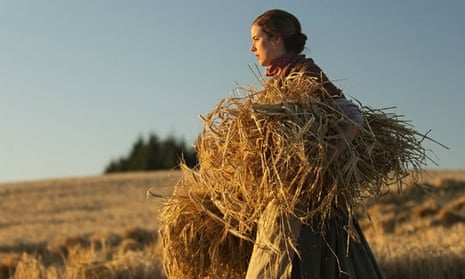A warning pops up before the Toronto press screening of Terence Davies’ new film: “The following has not been enhanced by IMAX and is not the IMAX experience”.
It got a laugh from the crowd, but actually Davies, perhaps British cinema’s pre-eminent nostalgist, has made a film that’s perfectly suited to the too-big screen. His adaptation of Lewis Grassic Gibbon’s classic novel is packed with emotional bombast, almost relentless in its lushness. The huge performances and bloated run time are a snug fit for the format.
Set in the coastal county of The Mearns (now Aberdeenshire) in north-east Scotland on the eve of the first world war, Sunset Song stars Agyness Deyn as Chris Guthrie, the teenage daughter in a farming family living under the repression of their violent dad (Peter Mullan). Chris, a dreamer and a book worm, finds a strange liberty in the dissolution of her family as a tragedy wrought from her dad’s violent temper pulls them apart.
Patriarchal regime and the broken clockwork of dysfunctional family life are hallmarks of Davies films dating right back to his debut, Distant Voices, Still Lives. To Sunset Song he also brings some of the impressionist wanderings that characterised his last film, 2011’s The Deep Blue Sea. Here, with Michael McDonough’s lavish cinematography he spends an age tracking sun beams across dusty rooms, panning dreamily through the lace curtains and out across the corn fields.
It’s all fairly indulgent. But Sunset Song also has a viciousness that stops it falling too deep into a slumber. Gibbon’s book, published in 1932, put readers in a spin with its depictions of childbirth and sex. Davies uses both boldly, staging a cluster of scenes that are as unsettling and grim as anything by Lars von Trier. Chris’s dad grabs her mum for what Gibbon called “their bit pleasure together”, his grunts cross dissolve into the sound of a horrifically difficult labour nine months later. Davies then cuts to the shaking hand of the doctor, eating a boiled egg. It’s spooky and dirty, quite brilliantly done. In a later scene the father suffers a stroke, coiling onto the floor and clawing at the mud. Mullan’s body strains into an arch that echoes the shape he made when he leant over to kiss his abused wife on her death bed. Love and death and punishment, all in a bundle at once.
Deyn, in the best role of her burgeoning career, has the right mix of tenderness and tenacity to make Chris feel real in a world that often doesn’t. She throws herself into the sing-songs (of course there are sing-songs), the blow ups, the pastoral meandering. The emotional highs of the last act are a bit of a reach, but she makes it, just.
Davies recently said that he doesn’t understand the modern world, preferring a romantic version “that doesn’t quite exist anymore”. With Sunset Song he’s again made a prize of beauty and found peace in the past. The director may not like the present, but I think he’d enjoy watching his film on an IMAX screen. Those corn fields feel like they roll on forever.
- This article was amended on Sunday 13 September 2015. The Mearns was in the area now known as Aberdeenshire, not Kincardineshire as we said. We also corrected the spelling of The Mearns, and the surnames of star Agyness Deyn and author Lewis Grassic Gibbon.

Comments (…)
Sign in or create your Guardian account to join the discussion